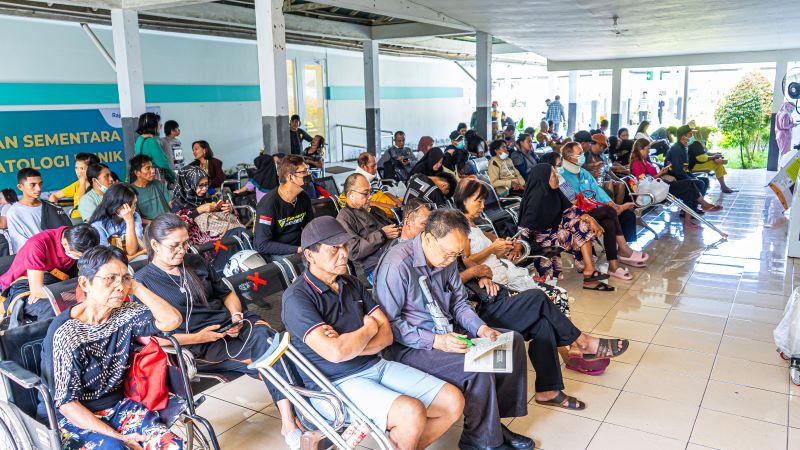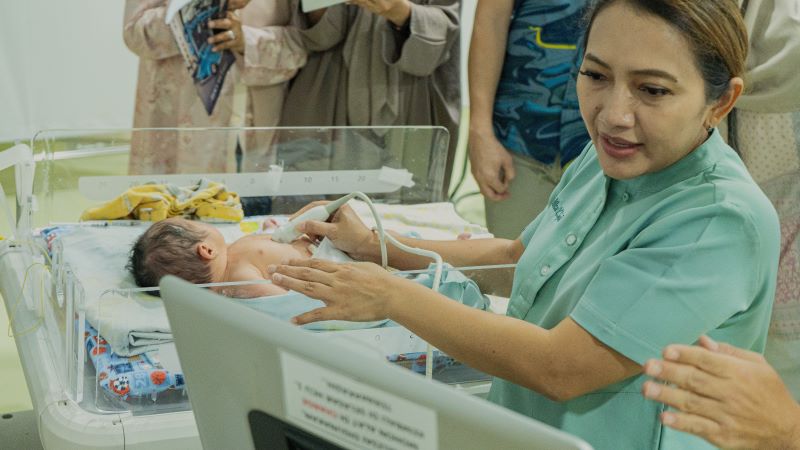Indonesia’s Ministry of Health has ambitious goals: lower the maternal mortality rate; improve cancer outcomes for women and children; and, ultimately, establish universal health care coverage. And, it’s using the ECHO Model to get there.
“Indonesia aims to reach and strengthen its network of 10,000 primary health care centers and 3,000 hospitals across 514 districts and 38 provinces,” says Dr. R. Soeko Werdi Nindito D., president director of the Dharmais National Cancer Center and chairman of the Association of Indonesian Vertical Hospitals. “Expanding capacity for treatment and diagnosis at earlier stages, especially through community health workers, is necessary [for patients to] access higher-level care when needed,” he says, adding: “The 37 ‘vertical’ hospitals are encouraged to utilize the ECHO Model to establish programs.” In Indonesia, a “vertical” hospital specializes in specific medical fields, such as cancer or heart disease, and often has advanced facilities and expertise.
In partnership with the Ministry of Health and the government-run hospital system, there are now 18 ECHO Hubs working to increase health coverage to Indonesia’s urban and rural populations through 38 programs focused on 10 ministry-identified priorities: cancer, diabetes, heart, gastroenterology-hepatology, infectious diseases, maternal and child health, mental health, strokes, tuberculosis, urology, and vascular conditions.

The lobby of RS R.D. Kandou Hospital in Manado, Indonesia. Credit: Dody Robinson Lubis for Project ECHO, November 2024.
Exponential Growth
Since 2021, more than 4,600 participants have attended 22,000 ECHO sessions in Indonesia. Today, ECHO Hubs include the Jakarta-based Dharmais National Cancer Center, as well as far-reaching sites: Padang Central General Hospital—roughly 800 miles northwest of Jakarta—and Manado Medical Center, located four days by ferry northeast of Jakarta.
Still in early stages of building a country-wide ECHO network, these ECHO partners are working to establish stronger hospital-to-periphery partnerships and expand ECHO programs focused cancer: breast cancer, cervical cancer, and pediatric cancers – especially leukemia.
“Cancer needs a multidisciplinary approach for better outcomes, and ECHO made it easier and accessible for our peripheral hospitals and doctors to get guidance from experts,” says Dr. Haridini Intan S. Mahdi, a pediatric oncologist and advisory board member of the Cancer ECHO Program .
Addressing Indonesia’s Priorities
For the Ministry of Health, improving maternal health care is a priority. Nearly 70% of mothers in Indonesia give birth without any perinatal X-rays or ultrasounds, partly because just 25% of health clinics have access to ultrasound machines. And, once they have the equipment, it is critical to provide training to staff on how to use the equipment.
To address high neonatal mortality rates related to untreated heart defects, Indonesia has new ECHO programs providing echocardiography training and two years of mentorship specifically for portable ultrasound equipment.
Hubs have also leveraged ECHO for emergency response, empowered by their ability to quickly launch programs to address avian influenza (bird flu) and mpox. “The Priority Health Problem Management ECHO Program in Indonesia utilizes ECHO to reach all government and private health services, all at once, with updated guidelines that can simultaneously improve the quality and accuracy of their services,” says Dian Triana Sinulingga, a clinical research scientist and project manager for ECHO at Dharmais National Cancer Center.
There is room to grow. Indonesia’s new ECHO programs address pollution and respiratory health issues—including lung cancer complications—and a program for asthma in primary health care. which had more than 1,000 participants in its first year.
To learn about Project ECHO in Indonesia, email us.
Featured Image: A provider and newborn patient at the Dr. Cipto Mangunkusumo National Central Public Hospital in Jakarta, Indonesia. Credit: Dody Robinson Lubis for Project ECHO, November 2024.

